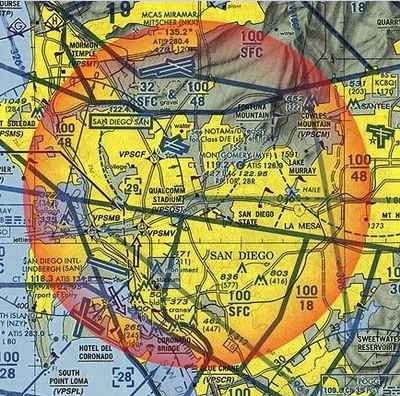Upset With Political, Economic Entities In San Diego Override
Efforts Of Federal Security Agency
 EAA is
warning that a dangerous precedent is being set
this week in the airspace over San Diego, Calif., as local
officials override federal jurisdiction during Super Bowl XXXVII on
Jan. 26. Setting aside security expertise within the Transportation
Security Administration (TSA), San Diego officials pressured the
White House to implement a general aviation no-fly zone in a
seven-mile radius of Qualcomm Stadium, the site of Sunday's NFL
championship game. The ban, which extends upward to 18,000
feet above sea level, means that all blimp and banner-towing
operations are prohibited from operating from 11 a.m. (Pacific
Standard Time) until 8 p.m. (PST) on Jan. 26. The ban also
closes Montgomery Field, a major general-aviation airport in San
Diego, during that period.
EAA is
warning that a dangerous precedent is being set
this week in the airspace over San Diego, Calif., as local
officials override federal jurisdiction during Super Bowl XXXVII on
Jan. 26. Setting aside security expertise within the Transportation
Security Administration (TSA), San Diego officials pressured the
White House to implement a general aviation no-fly zone in a
seven-mile radius of Qualcomm Stadium, the site of Sunday's NFL
championship game. The ban, which extends upward to 18,000
feet above sea level, means that all blimp and banner-towing
operations are prohibited from operating from 11 a.m. (Pacific
Standard Time) until 8 p.m. (PST) on Jan. 26. The ban also
closes Montgomery Field, a major general-aviation airport in San
Diego, during that period.
Homeland Security Director Tom Ridge approved the no-fly zone
Jan. 17. Ironically, while general aviation flights will be
prohibited, large commercial airliners will continue to fly from
Lindbergh Field, which is well within the seven-mile restricted
zone.

"There are many disturbing factors in the creation of this
no-fly zone," said Earl Lawrence (below, right), EAA Vice President
of Government and Industry Programs. "First is the notion that
local officials can continue to leapfrog through the federal
government, until they find a level that overrides the agencies
created by Congress to have authority over airspace and
transportation security.
"Secondly, general aviation entities that have worked with
federal officials to follow all security regulations are now
left out in the cold, with no hope of recovering lost
revenue. EAA is also concerned that general aviation
is sent to the sidelines again by local officials, while federal
agencies that have specific authority on aviation issues do not
have the full opportunity to use their expertise."
 General aviation did receive good news when the
size of the Super Bowl no-fly zone and the duration of the
restriction were announced, as severe weeklong restrictions
covering a much wider area were among the initial
proposals. The final determination, however, reversed
direction on some security measures already underway.
General aviation did receive good news when the
size of the Super Bowl no-fly zone and the duration of the
restriction were announced, as severe weeklong restrictions
covering a much wider area were among the initial
proposals. The final determination, however, reversed
direction on some security measures already underway.
Banner-towing operators, for instance, had been continually
assured that they would be able to fly over Qualcomm Stadium on
Jan. 26. Those operations had been willing to submit to a stringent
list of security procedures, including police inspection of
aircraft just prior to takeoff. The banner-towing operations
had prepared for the game upon receiving those regular
assurances.
EAA, as well as other organizations, have continually fought
measures brought by local officials, professional sports leagues
and major colleges to ban general aviation overflights of their
facilities. That includes federal legislation introduced to
place a blanket prohibition on general aviation, but not commercial
airline or military flights, over those large outdoor
assemblies.
EAA remains alarmed by a behind-the-scenes effort by
major sporting organizations over the past
decade. Those organizations have sought control of
the airspace over sporting events because they cannot
control the advertising or environment over the event,
similar to the exclusive rights they may sell and maintain in all
other areas in and around the event's location.
 "It's very easy for local officials to protect
themselves by using the 'security blanket' technique - urging a
prohibition on general aviation operations whether or not there is
any evidence that any threat actually exists," Lawrence
said.
"It's very easy for local officials to protect
themselves by using the 'security blanket' technique - urging a
prohibition on general aviation operations whether or not there is
any evidence that any threat actually exists," Lawrence
said.
"This issue is not going to go away for general
aviation. Legitimate security concerns are one
thing, but using them as a cover when the real issues may be
economic is inexcusable. General aviation pilots, business and
organizations must continue to educate local officials on what GA
is ... and what it is not."
 ANN's Daily Aero-Linx (04.15.24)
ANN's Daily Aero-Linx (04.15.24) Classic Aero-TV: 'No Other Options' -- The Israeli Air Force's Danny Shapira
Classic Aero-TV: 'No Other Options' -- The Israeli Air Force's Danny Shapira Aero-News: Quote of the Day (04.15.24)
Aero-News: Quote of the Day (04.15.24) Airborne 04.16.24: RV Update, Affordable Flying Expo, Diamond Lil
Airborne 04.16.24: RV Update, Affordable Flying Expo, Diamond Lil ANN's Daily Aero-Term (04.16.24): Chart Supplement US
ANN's Daily Aero-Term (04.16.24): Chart Supplement US






